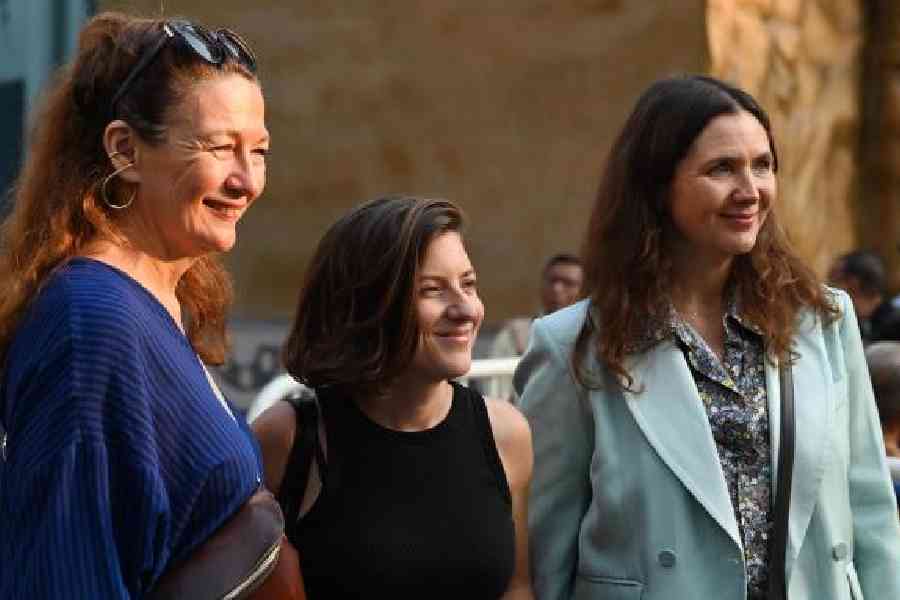Every year, the Kolkata International Film Festival announces a focus country and this time it was France. Emphasis was on films by women filmmakers of France. Three women filmmakers, who travelled all the way from ‘The Hexagon’ country to KIFF for the screening of their films — Celine Rouzet (For Night Will Come), Caroline Vignal (It’s Raining Men) and Elise Otzenberger’s (Call of Water), covered a range of subjects, from the mind and mystery to fantasy and women’s issues, dreams and desires. At Nandan, t2 caught up with them to talk about the new wave of women French filmmakers, their films and more.
Is it your first time in the city? Did you get a chance to explore Calcutta?
Caroline: Yes, it is our first time in Calcutta.
Elise: We explored a little. We went to the place where people make idols…
Celine: Kumartuli. I particularly loved the atmosphere of Kumartuli , the traditional potters’ quarter in North Calcutta, near the banks of river Ganga. The narrow lanes, the magic and religiosity in the air, both the liveliness and quietness of the area populated with artisans and inhabitants, the beauty of clay idols… I went there twice!
Caroline: We also went to an Indian wedding. It was the first time we saw a wedding like this.
Elise: Yes! Very different from a French wedding.
Did you get to taste the food in the city?
Elise: Yes! At that wedding, the food was amazing!
Celine: I had a kind of fish curry from Bengal. I can’t remember the name... delicious!
Did you get to explore any regional or Indian films?
Celine: I recently watched Payal Kapadia’s All We Imagine As Light, which I absolutely adored. It’s a very inspiring film, full of revolt and love.
Caroline: Yes, it was at Cannes this year. I really liked that.
Elise: At KIFF, I couldn’t watch anything else other than my own movie as I was very busy with it. But sometimes I watch Bollywood movies… the commercial ones. And I love them (laughs)!
How are festivals like KIFF helping in the global visibility of a new wave of women French filmmakers like yourself?
Celine: I was honoured and delighted to be invited by KIFF and to have my film, For Night Will Come, screened in front of an Indian audience. The welcome was magnificent. We also took part in a round-table discussion organised by Alliance Française du Bengale. Several young female students came to see me afterwards with great enthusiasm. I feel that seeing women directors talk about their own films and their career paths can encourage other young women to take the plunge, which is very positive.
Elise: It was very interesting to have my screening here. The hall was full. I was very happy. It is very different from our country and here. It is not the same life at all. It is always good to have this kind of exchange.
Caroline: I think it is a very good thing that KIFF is showing our movies. I don’t know what kind of films people see here.
What kind of stereotypes are you all challenging, what are the topics you are focusing on?
Elise: For me, I work on very personal stories. This film was and my next will also be. Of course, it gives me the opportunity to think about and speak about a lot of other issues. For example, in Call of Water, I could speak about the women’s situation right now but the start is a very personal subject.
Caroline: For me, it is the same. I try to work on very personal subjects. I work on very personal and intimate films and I try to make comedies. I work on subjects that are a little more universal. As I am a woman of more than 50 years now, I talk about things from where I stand in life.
Celine: I like political films that question reality while romanticising it. I’m very interested in the suffering of the marginalised and the fear of the other, the violence of the norm and the savagery that lurks beneath the surface of ordinary life. The rejection of difference, the question of race and the violence of neo-colonialism are themes that obsess me. What my two previous films have in common, and what I suspect will be the next, is a mixture of tenderness and violence. It’s also my obsession with microcosms, those inward-looking worlds with their own laws and a concentration of our society’s injustices.
Something that the new wave of filmmakers are focusing on in their work is to alter the existence of the male gaze in French films that was earlier predominant. How important is it for your generation to come out and alter that gaze and show women in a different light…focusing on their desires and dreams?
Celine: It’s a constant question in my work! To make women exist as they are, as beings who dream and reflect, as desiring subjects capable of making decisions and taking action, rather than mere objects of desire. It’s also through the emergence of new collective narratives that society will change.
Elise: In France, we are quite lucky..there’s a helping system so we can make a lot of different movies and there are many new directors now. The new directors have unique styles and they are all working on different subjects. But it is difficult to see it as a kind of movement…I will be 80 years old or something like that to see it take the shape of a cinema movement!
Caroline, your film talks about the quinquagenarian women who are breaking stereotypes and exploring their desires… in India too, many filmmakers are working on such subjects now. What inspired you to make this film?
I am glad to hear that because we don’t really get to meet the international audience. I was thinking people don’t have the same life here, so they will probably not enjoy it. The day we screened it, I saw a lot of men in the audience. There were hardly any women. People didn’t laugh a lot! Someone told me that in festivals, people come to watch serious films and that’s the reason they didn’t laugh or perhaps it was the screening slot!
There is a friend of mine who told me a story about what she was going through and I really felt she was giving me a movie. She was on a dating app and is a little older than me and not the kind of person that I could imagine on dating apps! She was trying to meet men and tell a funny story about it. She first said: ‘It is raining men when you are in this, it is really raining men.’ And I told her: ‘You are even giving me the title!’ (Laughs)
Elise, your film Call of Water is a fantasy title. What inspired you to tell this story?
I always loved the idea of cinema as something that would be a place to put magic and that’s what I did in my film.
Celine, your film For Night Will Come caters to a young adult audience and is also a fantasy film exploring the co-existence of vampires in the human world. What inspired you to make this film?
As a child, my older brother, Vincent, was scared of vampires and said they came into his bedroom to talk to him. The years passed and he became obsessed with them. He seemed to feel a connection with those scary, dangerous, yet fragile and misunderstood creatures. Just like them, my brother was born different. It wasn’t obvious at first but as he grew up, the gap between him and other people became ever more apparent. For Night Will Come was inspired by my family and my teenage years. But the only way for me to tell that story was through this genre. What interests me in the figure of the vampire is that it is a fragile and frightening monster, whose condition is invisible at first sight — difference, disability, depression or adolescent ill-being are closely associated with it. You could say that this film sums up my obsession— disturbing characters crack up a very conventional world.
Your film also won the Jury award at Cannes and now is at KIFF. There have been many popular films and books on the fantasy world of vampires. What is clicking with the audience?
This film is about the story of a young man with vampirism, desperately trying to fit in a world that doesn’t look like him and to find some kind of answer through love. I think we can all identify with this quest. It also focuses on marginality and conformism, family sacrifices, outbursts of anger, wild desires but also highlights the savagery lying beneath the surface of ordinary Western life. I like the political load and the intensity of emotions and sensations specific to the cinema of the imaginary worlds. In movies, vampires have embodied marginality, predation, contamination and eternal love. For my part, I see the vampire as a fragile and tormented figure, dissident and eminently erotic. But what inspired me most are monster-and-exclusion movies like Cronenberg’s The Fly, Tim Burton’s Edward Scissorhands and The Elephant Man by David Lynch. In the case of For Night Will Come, vampirism is a condition as mysterious as would be for an orphan with disease or disability at birth. It’s almost a case study— what happens if a teenager with vampire symptoms arrives in a quiet, uneventful residential neighbourhood? I looked for a jubilant, Parasite-like tone.
KIFF is not only focussed on France as a country but also highlighted women filmmakers from France in this edition. Are there any challenges in your profession based on your gender?
Elise: I think it is less than before. It is in all professions but right now things are changing.
Caroline: It is still difficult for us to make movies that are very expensive that our male counterparts can easily attempt. We still choose subjects about family, about intimacy because we are women.
Celine: Yes, although progress is being made and attitudes towards women directors are changing, the figures speak for themselves: only just over a quarter of European films are directed by women, according to the 2023 edition of a study by the European Audiovisual Observatory, which deplores the ‘under-representation’ of women in decision-making positions… over the period 2018-2022, only 26 per cent of European feature films (from EU member countries) were directed by women filmmakers.











